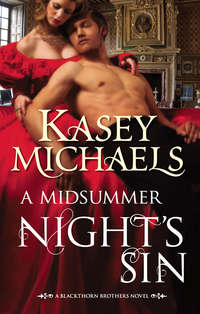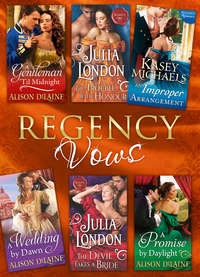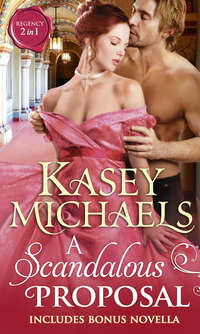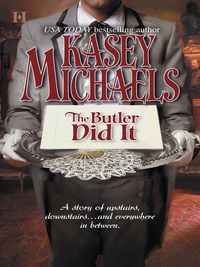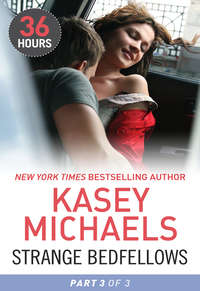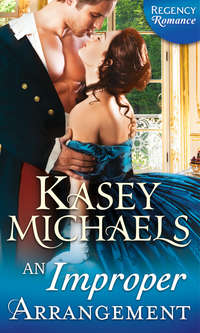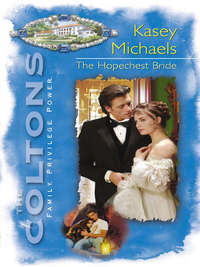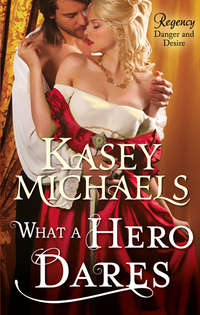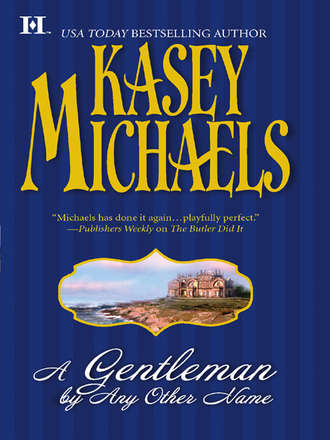
Полная версия
A Gentleman By Any Other Name

Praise for USA TODAY bestselling author
KASEY MICHAELS
“Michaels has done it again…. Witty dialogue peppers a plot full of delectable details exposing the foibles and follies of the age.”
—Publishers Weekly, starred review on
The Butler Did It
“Michaels truly shines in this gem of a historical romance rich in witty dialogue and intriguing political maneuverings.”
—Booklist on Shall We Dance?
“If you want emotion, humor and characters you can love, you want a story by Kasey Michaels.”
—New York Times bestselling author Joan Hohl
“Kasey Michaels aims for the heart and never misses.”
—New York Times bestselling author Nora Roberts
“Kasey Michaels creates characters who stick with you long after her wonderful stories are told.”
—New York Times bestselling author Kay Hooper
“Michaels demonstrates her flair for creating likable protagonists who possess chemistry, charm and a penchant for getting into trouble. In addition, her dialogue and descriptions are full of humor.”
—Publishers Weekly on This Must Be Love
Kasey Michaels
A Gentleman by Any Other Name

Dear Reader,
In the twelfth century Thomas à Becket was assassinated at Canterbury on the alleged orders of his friend King Henry II. Legend has it that Henry ordered Thomas’s body burned and the bones scattered. It is possible the remains, buried in the cathedral at Canterbury, were found and destroyed during the Reformation. Then again, the monks may have hidden the body, even interred the bones in another man’s grave.
Perhaps this is why Ainsley Becket, a student of history, among his other, varied and not always laudable pursuits, found a small, secret satisfaction in coming to Kent in 1798, bearing the name A. Becket. For he, too, had been “murdered” by his best friend, and he had relocated himself to a place where he would not easily be found.
With him, Ainsley had brought his children, those of his heart, and Cassandra, the infant his beloved Isabella had borne him. His children. His redemption, his promise, his reason for drawing breath, his hostages to fortune.
Over the ensuing years the second oldest, Courtland, became Ainsley’s strength, his rock. Morgan, the fiery one, had been orphaned when her sailor father, name unknown, buttoned his pants and got up from the lice-ridden bed of her prostitute mother, who had sold her to Ainsley the day she was born.
Then there was Eleanor, Ainsley’s sea sprite, his delicate flower, his conscience. Spencer, the wild one, was Ainsley’s potential heartbreak, with Fanny and Rian hotly contending for the same honors.
And lastly, there was the oldest, Chance, the boy Ainsley had rescued from a Port-au-Prince pub. Old enough to remember his beginnings, Chance had spent all of his thirty years trying to forget.
I invite you to come along with me as we meet Chance and all of the Beckets of Romney Marsh.
Enjoy,

To Michael Robert Seidick.
Welcome to the world!
CONTENTS
CHAPTER ONE
CHAPTER TWO
CHAPTER THREE
CHAPTER FOUR
CHAPTER FIVE
CHAPTER SIX
CHAPTER SEVEN
CHAPTER EIGHT
CHAPTER NINE
CHAPTER TEN
CHAPTER ELEVEN
CHAPTER TWELVE
CHAPTER THIRTEEN
CHAPTER FOURTEEN
CHAPTER FIFTEEN
CHAPTER SIXTEEN
CHAPTER SEVENTEEN
CHAPTER EIGHTEEN
CHAPTER NINETEEN
CHAPTER TWENTY
CHAPTER TWENTY-ONE
CHAPTER TWENTY-TWO
CHAPTER TWENTY-THREE
CHAPTER TWENTY-FOUR
CHAPTER TWENTY-FIVE
CHAPTER TWENTY-SIX
EPILOGUE
CHAPTER ONE
London, 1811
CHANCE BECKET SAT IN the formal drawing room of his Georgian house located in Upper Brook Street, not two blocks from Hyde Park, unaware of his expensive, fashionable surroundings.
No, not unaware. Uncaring.
How could he not care? Wasn’t this what he wanted, what he’d always wanted? What he worked for, what he longed for…what he had achieved almost entirely on his own?
Perhaps that was the rub. He had done nothing entirely on his own. His extensive education had been a gift from his father, Ainsley Becket, the mysterious, reclusive and very wealthy Becket of Romney Marsh.
This house? This house had been a gift from his late father-in-law. Even the furnishings, the fine silk sofa he slouched in now, had come to him along with his wife, Beatrice.
Chance sipped from the wineglass that had moments earlier dangled from his fingertips, nearly spilling onto the fine Aubusson carpet.
He was a sham, a farce, living no more than the shallow dream of a reality that had fallen far short of all his youthful expectations. Gentlemen were born, not constructed out of whole cloth. All he’d achieved was the pretty shell; there was nothing pretty inside.
And yet, this was all he had, all he could ever hope to have, which was why Alice had to be rescued from him before she became as shallow and unfeeling as himself.
“Mr. Becket, sir? There is still one more waiting on you downstairs. Perhaps you are fatigued. Shall I send her off? Or do you wish to see her?”
Chance blinked away his self-pitying thoughts as he looked at his butler. “Forgive me, Gibbons, I’m afraid I was woolgathering. What a thoroughly depressing afternoon this has been. But there’s another woman? I had thought that profane Billingsgate drab was the last of them.”
“Oh, no, sir, there’s still the one more, and I apologize again that Mrs. Gibbons still feels too poorly to have handled this chore herself and you’ve had to take the trouble. She’d be up and about if she could be, sir, but her nose is still running a treat and—”
“The last applicant, Gibbons, if you will. Concentrate, please. Time is running short if I am to have someone for Alice before we leave.”
“Oh, yes, sir. This last is younger than the rest, sir, and with a civil tongue in her head, if I may say so.”
“Please, Gibbons, don’t raise my hopes. And please don’t apologize yet again for your wife’s illness. I’m sure she didn’t take to her bed with that putrid cold you keep telling me about simply to thwart me in my hour of need.”
“Yes, sir. I’m sorry, sir. That is—”
Chance waved the butler to silence and stood up, heading for the drinks table, for interviewing potential nannies had turned out to be thirsty work. “We’ll make this quick, shall we? I promised Miss Alice I’d join her for her evening tea, although I have been informed I am not to be the guest of honor, as that distinction is reserved, as always, for her stuffed rabbit.”
“Buttercup. Yes, sir.” Gibbons bowed. “We shouldn’t wish to keep Miss Alice waiting. Although this establishment will be a cold and dreary place without her, sir, if I may be so bold.”
“Our only sunshine, gone. Yes, Gibbons, I am aware of the sacrifice. But it is Miss Alice we must consider. London is no place for a motherless child.”
“Very good, sir,” the butler said, bowing yet again before leaving the room.
Chance took up his position in front of the fireplace, placing his filled wineglass on the mantel as he stood, hands clasped behind him, awaiting what was sure to be another disappointment. Buttercup. Yes, of course. A good father would have known that.
“Mr. Becket, sir,” Gibbons announced from the doorway. “Miss Carruthers.”
“Mr. Becket,” the woman Chance now knew as Miss Carruthers said, sweeping into the room with all the grace of a duchess and the wardrobe of a miller’s daughter dressed up for Sunday services. A woefully unsuccessful miller. But then, if the woman had a full purse, she would not be hiring herself out as a nanny.
“Miss Carruthers,” Chance said, indicating with a slight sweep of his arm that she should take up her seat on the sofa to the right of the fireplace, while he, bringing his wineglass with him, retook his own seat. “You have come in answer to my advertisement?”
“Apparently so, Mr. Becket.” Her tone was neutral, her diction reassuringly untainted by Piccadilly, her words not quite as subservient as he might have liked. And her perfect posture would put a military man to shame.
He watched, rather nonplussed, as Miss Carruthers stripped off her gloves, noting her long, tapering fingers, her neatly trimmed nails and the fine mending on the thumb of the left glove. She then removed her aged straw bonnet to place it beside her on the sofa, revealing a thick head of warm blond hair she’d mercilessly scraped back from her forehead and into a high, thick and rather lopsided bun.
Her skin was quite nice, pale but with hints of color, and her nose was delightfully straight above a full, wide mouth and a determined chin. He felt a stir of interest, which surprised him.
Miss Carruthers was down on her luck, most obviously, but she had pride and possibly breeding—definitely more than he could claim, but then, most anyone did. Best of all, she was clean and, if his luck was to have turned all the way for the better, would be desperate enough for a decent wage to give up the delights of London for the mist and damp of Romney Marsh.
In any event, at least Alice wouldn’t take one look at the creature and run screaming for her nursery.
Chance didn’t realize he’d been staring until Miss Carruthers raised her chin and looked at him with a most incredible pair of long green eyes framed by brows too low and straight to be considered in vogue. “Forgive me, Miss Carruthers. Have you been waiting long? Would you care for a glass of lemonade?”
Julia Carruthers frowned, wondering if she should accept—and take a step toward insinuating herself—or refuse, keeping the distance she was quite certain master and servant maintained. But, dear, she was thirsty. “Thank you, sir, I appreciate your offer. Have there been many other applicants?”
“None worth considering, no. I’m afraid you’re the last,” Chance said as he moved to the drinks table. A pitcher of lemonade was always kept there for Alice.
He bent over, opening the double doors beneath the tabletop, and Julia watched as he retrieved a lovely glass goblet, taking note of Chance Becket’s tall, well-formed frame. That and the black mourning band pinned to his sleeve above his left elbow.
She’d expected a woman, a mother, not this young, handsome society gentleman. She’d been prepared for a woman. She’d dressed for a suspicious woman with a husband or grown sons in the house.
Now she felt an absolute drab, all angles and third-best finery and with her hair pulled back so tight a headache had been throbbing at her temples for the entirety of the three hours she had been cooling her heels in Mr. Becket’s ground-floor sitting room. She’d spent that time as the very last of a steadily decreasing number of other applicants, some of whom had given her pause as she wondered if they all could have been the same species as herself. So her hopes had climbed. But now she worried.
Julia took the offered glass, happy to discover that Becket’s household was one that could support the frivolous expense of ice. How wonderful it would be to have her days of scraping for any bit of luxury behind her, even if that meant she had to ride herd on a passel of thoroughly spoiled children.
“Thank you, sir,” she said, dropping her gaze to her lap to pretend she hadn’t seen the assessing look in Chance Becket’s green eyes.
Not at all like her own eyes, which her father had told her reminded him of the color of spring grass. Chance Becket’s eyes were the dark green of a stormy sea at twilight, so green they were nearly black, and decidedly intelligent.
Julia’s nervousness increased, which was never a good thing, for being nervous made her angry with herself, and she often said things or did things she wouldn’t say or do if she felt more in charge of the situation. She knew this because her father had pointed this failing out to her on several occasions, mildly informing her that she could, now and then, become somewhat pertinacious.
What she knew now was that she was acutely aware of the man sitting across from her and that he made her very nervous. Why was he just sitting there? Why didn’t he say something? Was she supposed to say something? Describe her qualifications? Drink more lemonade, so that he could be assured she didn’t approach eating and drinking like a cow at the trough? What?
She dared to look into those eyes once more. “I can only hope I am the last applicant it will be necessary for you to interview, Mr. Becket, and that you will engage my services.”
There. That had sounded fine, hadn’t it? She’d said enough, and just enough. It was his turn now. Julia went back to looking at him. He really did fascinate her. Perhaps in the way of the snake and the mongoose? Hopefully not.
The man had strong features that didn’t seem completely English. His unfashionably long hair, combed back and tied in a thin black grosgrain ribbon at his nape, seemed darker close to his head, as if the sun had teased gold into each strand only as it grew. Not an English blonde. In fact, with his strong nose and well-defined lips, with his high cheekbones, he could almost be of Italian descent. A Roman in his ancestral past perhaps? A warrior Roman who’d conquered some fair English maiden?
And she should stop being fanciful. She had no time to be fanciful. She raised her hand, politely coughed into her fist, hoping he’d speak again before they both froze here, mute, into eternity.
Chance struggled to come up with a reasonable question, one that had nothing to do with asking her why such a strikingly handsome woman as herself would wish to be nanny in someone else’s household. A woman like this should be wed, with children of her own.
“I’ve yet to see your letters of recommendation, Miss Carruthers,” he said at last, reminding himself that he was in charge here, after all.
“As to that,” Julia began, then sighed. “I have none, sir, as I am new to London. In truth, I have never worked as a nanny, although I believe I am qualified. I most thoroughly enjoy children, and my education has not been lacking.”
Never been employed as a nanny? That seemed fair, in some twisted way, as he’d never before employed a nanny. It might be better if neither of them knew how they should go on and just muddled along together. With Alice in charge, of course—he’d learned that much, at least, in the past six months. “And that slight accent? Do I hear a bit of Kent in your speech, Miss Carruthers?”
Julia smiled. “I didn’t think it was obvious, Mr. Becket. But, yes, I was raised in the village of Hawkhurst. My father, now deceased, was vicar of a small church there, although he came originally from Wimbledon.”
“Hawkhurst, you say. Very near the beginnings of the Marsh,” Chance said, his tone now flat. “Then I would suppose you have no great wish to go back?”
Julia frowned. “If you are asking if I would enter your employment here in London just to leave it so that I might return to Kent? No, sir, I would not do that. There is nothing for me there now that my father is gone.”
“Ah, the classic story,” Chance said, suddenly more comfortable. “The dear child of an adored father, cut adrift and near penniless when the man died, was taken to his final reward on the wings of angels. Surely, Miss Carruthers, you could have come up with better than that? You’re sounding very much like one of the penny press novels my late wife devoured along with her sugared treats.”
Julia stood up, her gloves falling to the floor. She bent to retrieve them, knowing that were she a man, she would then employ one of them to slap this man’s face and challenge him to a duel. If she were a man.
As a woman, however, there was only retreat, but she would do her pertinacious best that it would not be ignominious, and hang the consequences. “I believe we’re through, Mr. Becket. You enjoy your amusement at my expense, and I will show myself out.”
Chance came to his feet, holding out his arm as if to block her escape. Prickly thing, wasn’t she? And he was desperate. “A thousand apologies, Miss Carruthers, my remarks were entirely uncalled-for, as well as rude. My only excuse is that it has been a rather trying day.” He spread his hands, palms up. “If you had references…”
Julia took a breath, reminded herself of the slimness of her purse. And knew that didn’t matter. “I do not, sir. I have only my word and my name, which clearly are not sufficient here in sophisticated and extremely impolite London. Again, sir, good day to you.”
Physically tackling her probably wouldn’t work. Damn, Chance swore to himself. The one prospect who seemed even marginally acceptable, and he’d bungled things badly. Worse, he’d somehow allowed her the upper hand, it would seem, because now he was all but groveling, as if she would be doing him some marvelous favor if he hired her. Confounding woman! “I wish you would reconsider. And I do apologize again.”
Julia hesitated. She really did need the money she would earn. It would be nice to know she had a roof over her head when the sun set tonight, one she did not have to pay for out of her meager funds. She turned, took another look at Chance Becket. His eyes really were the color of a storm-tossed sea…which should have less than nothing to do with her decision. “I…um, that is—”
“Papa? Buttercup is very hungry.”
Both Chance and Julia swiftly turned their heads toward the doorway.
“Alice,” Chance said abruptly, “you were to remain upstairs.”
The child’s bottom lip came forward in a pout. “I’ve been upstairs forever, Papa.”
Julia was entranced. From her lovely dark blond curls to the tips of her white satin slippers, the child could have modeled for one of Botticelli’s angels. Clearly she was her father’s child but redone in a delightfully soft and feminine form. “She’s precious and the very image of you, Mr. Becket,” Julia said quietly. “How your heart must swell each time you look at her. How old is she?”
Chance answered before he could think too much about the surprising comment or the question. “Alice is five. Her mother’s been gone for six months, and I’m afraid I’ve allowed her to run a little wild. She should be in the nursery.”
“She should be where she’s happy to be,” Julia said, smiling at the child. “And clearly she wishes to be with you.”
Chance ran a hand over his hair, then impatiently pushed at a lock that escaped the ribbon. “I should introduce you.”
“Yes, thank you, but I think Alice and I can get to know each other on our own,” Julia said, already walking toward the child. She went down on her knees a few feet away from Alice and said, “Hello. I’m Julia and I’m very pleased to meet you, Alice. Is that Buttercup? She’s very pretty.”
Alice looked at the yellow rabbit tucked under her arm. “He’s a boy.” She held out the toy. “See? Papa and I tied a blue ribbon around his neck. Isn’t he a boy, Papa?”
Chance walked across the room to stand beside his daughter, one hand on her shoulder. Mine, his gesture announced without words, although he didn’t consciously realize what he was doing. Treat her well or prepare to deal with me. “This week, yes, Buttercup is a boy. Where is your nurse, young lady?”
Alice shrugged. “She’s napping, Papa. She’s always napping.”
“When she isn’t nipping,” Chance growled quietly, and Julia looked up at him, seeing her opportunity and immediately seizing it.
“I could take up my duties today, Mr. Becket. At this very moment.”
“Really, Miss Carruthers?” Chance leaned down to kiss his daughter’s head. He should have thought to produce Alice earlier, for she seemed to be his trump card. “Run along upstairs, poppet. I’ll come join you very soon.”
But Alice was looking at Julia, who was still on her knees on the carpet. “You’re pretty. Mama was pretty. Would you like to come to tea?”
“I don’t know, sweetheart. We’ll have to ask your papa.” Julia got to her feet and looked at Chance. Waited. Then he smiled, and her heart skipped a beat.
“So we’re quite settled then, Miss Carruthers?”
“Yes, Mr. Becket, I suppose we are. Quite settled.”
The woman was transformed when she smiled, Chance realized, going from pretty enough to very nearly beautiful. If only he didn’t think she might be smiling because she had bested him in some unspoken contest between them. “We’ll discuss your wages at another time. But I must warn you, Miss Carruthers, we are not remaining in London above another two days.”
“We’re not?” Julia asked, her heart doing another quiet flip as Alice slipped her small hand into hers. “You have a country residence, sir?”
“I do. But we travel to Romney Marsh, to my father’s estate, where you and Alice will remain while I return to London and my duties at the War Office. Are you still so anxious to be in my employ, knowing you’ll once more be stuck in the back of beyond?”
Julia squeezed Alice’s hand. “I can think of nothing I would enjoy more, Mr. Becket, than being Alice’s nanny, no matter where that takes me. But I will say that London, I find, holds very little appeal. I much prefer the countryside.”
“And I wish you joy of it, Miss Carruthers. I’m sure my family will welcome both you and Alice to Becket Hall with open arms.”
“And you, sir?” Julia dared to ask, because Alice had accepted her and she knew her battle was already won. “You don’t enjoy Kent?”
The woman was entirely too insightful for his comfort. It was time for him to be done with this. “Wind and marsh and sea and mist. And sheep. More sheep than people, except for the people who are mostly sheep themselves.” Suddenly he wished to be alone. “No, Miss Carruthers, I do not enjoy Kent. Now, if you’ll excuse me, I have important matters to attend to while you and Alice have your tea.”
“Papa, you promised,” Alice said, letting go of Julia’s hand to scamper after him as he turned to leave the room.
Chance was instantly contrite, guilty. “I did, didn’t I, poppet. All right. You take Julia upstairs and show her the nursery, and I will be there…momentarily.”
Alice turned back to Julia once her father had disappeared down the hallway. “It’s all right, Julia. Papa forgets, that’s all. Mrs. Jenkins says he doesn’t care about me, but that’s not true. He’s sad with Mama gone.” Then the child smiled. “But soon we’ll visit all my aunts and uncles and my grandpapa and we’ll all be so happy.”
“You’re a very wise little girl.” Julia held out her hand and Alice took it. “Tell me, do we like Mrs. Jenkins?”
The little girl sniffed, gave a toss of her golden curls. “No, Julia, we do not like Mrs. Jenkins at all. She snores and she smells when she breathes. I’m so glad she’d rather poke a stick in her eye than go to live at Becket Hall. And now Buttercup and I have you, and she can go away.” Alice looked up at Julia. “Why would anyone want to poke a stick in her eye?”
“A good question, as I nearly did just that a few moments ago with your papa,” Julia said as they headed up the stairs, three whole flights, to the top of the house. “Oh, isn’t this pretty,” she said as they stepped into a large room with too few windows. “Aren’t you a lucky little girl.”
Alice became very serious. “No, I’m a motherless child and can never be happy again,” she said, clearly parroting someone else’s words.
“Mrs. Jenkins said that?”
Alice nodded, holding Buttercup close. “She is very put out that I am not dressed head to toe in black because Papa said I shouldn’t. And when I laugh she tells me I’m unnatural. What is that? Unnatural?”


